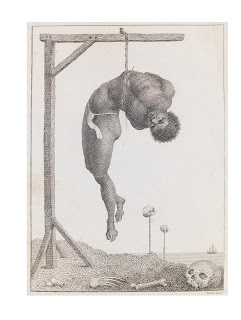 |
| A Slave Hung from a Gallows ©Victoria & Albert Museum |
Political dissent was a dangerous business at this time following the French Revolution as the authorities in Britain feared a similar uprising and suspects were often arrested for sedition for propagating revolutionary ideas. Although Iolo was careful to omit, on advice from Johnson, some anti-royalist sentiments he had penned, some of the more conservative London-Welsh attendees at the Gorsedd were clearly dismayed when Iolo read out potentially seditious verse as part of the ceremony:
Come Liberty with all thy sons attend
We’ll raise to thee the manly verse,
The deeds inspired by thee rehearse.
Iolo was clear, as was William Blake, that ‘Bardism’ was a medium not only of druidic expression, but also of the creed of Liberty. Part of that creed, for the radicals of this time, was the opposition to slavery and the support of William Wilberforce’s campaign to have it abolished. Verse in praise of Wilberforce was therefore also read out by Iolo as part of his address to those assembled for the Gorsedd. Other radicals that Iolo fraternised with in London at this time included the young poet S.T. Coleridge. Iolo met him again some years later when returning to Wales from another stay in London. He walked the whole way and so stopped off to rest in Bristol where he stayed with a friend. While there Iolo attended an anti slavery rally which was addressed by Coleridge and they renewed their acquaintance. At this time sugar was one of many commodities being made widely available in Britain and much of it came from slave plantations in the West Indies. One piece of advice given to the audience in the anti-slavery rally was to boycott the produce of slavery, perhaps the earliest example of the ‘fair trade’ principle.
Later, when Iolo was the proprietor of a short-lived shop in Cowbridge in the Vale of Glamorgan he made a point of selling sugar that was, as he advertised it “untouched by human gore”. His customers, however, preferred to buy their sugar elsewhere, and without this guarantee, because it was cheaper. Iolo responded by displaying part of one of his English poems:
Behold on Afric’s beach alone,
Yon sire that weeps with bitter moan:
She, that his life once truly bless’d
Is torn forever from his breast,
And scourged, where British Monarchs reign,
Calls for his aid, but calls in vain.
But his verse had little effect, the shop failed and he was bankrupt.
His verse in Welsh was another matter. It’s effects, one way and another, have been far-reaching. Whatever the limits of Bardism in English, Barddas encompasses all that Iolo could have hoped for it. He did not live to see that, but slavery was abolished in his lifetime.
A timely piece. I hadn't picked up on the anti-slavery themes in Iolo or Blake much so thank you for highlighting them.
ReplyDelete